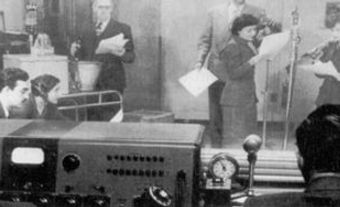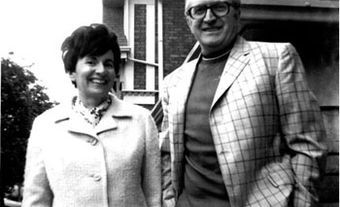Theatre New Brunswick
In the decades prior to the 1964 opening of the 1100-seat Beaverbrook Playhouse in Fredericton, and during that facility's early years under Alexander Gray (1964-66) and successor Brian Swarbrick (1966-68), the city was theatrically served by amateur groups and by professional tours - mostly from Ontario. Walter Learning, appointed general manager in 1968, decided to make the Playhouse a producing home for professional theatre with the name Theatre New Brunswick (TNB), with himself as artistic director, and with the purpose of mounting professional productions in Fredericton and touring them throughout the province.TNB was officially founded in January 1969, funded largely by a $20 000 grant from the Beaverbrook Foundation. After the prerequisite 2-year wait, the CANADA COUNCIL began adding a yearly grant of $12 500 to that of the Foundation. By 1971, TNB was taking each of its 4 or 5 productions on a 1050 km, 2-week touring circuit to Saint John and Moncton as well as to smaller venues such as St Stephen, Sussex, Woodstock, Bathurst and Edmundston. The popularity of Walter Learning's play choices (a blend of light and serious American and British scripts) was rewarded by a Beaverbrook Foundation grant of $2 million at the end of the 1971 season for a major upgrading of the Playhouse facility. In that same year, the subscription rate in Fredericton was an astounding 10% of the city's population. In 1975, TNB's school-touring Young Company was founded by Learning, Paul Hanna and Keith Sly. When Learning left in 1978 to head the theatre section of the Canada Council, TNB's subscription rate had just peaked at 8500 and the company had no deficit.
Malcolm Black (1978-84) took over as artistic director from Learning and brought with him the experience of 2 decades working in principal theatres of Canada and the United States. Janet Amos (1984-88) came from the Ontario BLYTH FESTIVAL with a strong interest in creating a venue for Canadian scripts. Sharon Pollock led TNB through a storm-filled period (1988-90) as she fought for artistic integrity against a board of governors concerned with financial stability. Michael Shamata (1990-95), through a judicious use of small-cast shows, momentarily slowed the momentum of increasing shortfalls and declining box office.
Walter Learning returned as executive producer in 1995 to an organization with weak ticket sales and a large deficit. Over his 4 years he was able to post an operating surplus and to convince the provincial government of the legitimate need for continued and increased funding. When he left in 1999, TNB's administrative structure was split along artistic and financial lines. David Sherren, who had come to TNB in 1998 from London's GRAND THEATRE, was appointed artistic director. Larry Simpson, a former financial administrator in the provincial government, took on the role of CEO.
TNB has provided actors (such as Patricia Vanstone and C. David Johnson) and designers (such as Michael Eagan, Debra Hanson, and Patrick Clark), with opportunities to demonstrate skills early in their careers. In the 1970s it offered world premieres of 3 plays written jointly by Alden Nowlan and Walter Learning: Frankenstein (1974), The Dollar Woman (1977) and The Incredible Murder of Cardinal Tosca (1978). Since the early 1980s its seasons have included many first productions by Fredericton's Norm Foster: Sinners (1983), The Melville Boys (1984), My Darling Judith (1987), The Affections of May (1990), The Motor Trade (1991), Wrong for Each Other (1992) and Office Hours (1996). Two of Herb Curtis's novels were first adapted for the TNB stage: The Americans Are Coming (1997) and The Last Tasmanian (1999).
TNB retains its founding purpose: to tour professional theatre throughout the province. The province, however, has changed. In its early years TNB almost singlehandedly defined theatrical culture in a provincial world of high-school stages, primitive cable television and few entertainment options. Later, the lure of newly renovated theatres in Moncton (Capitol, 1993) and Saint John (Imperial, 1994) to big-name touring shows and headline performers, along with seductive innovations in electronic amusement, has created attractive alternatives for what used to be TNB's entertainment dollars.
TNB's subscription sales dropped to a low of 4500 in 1996 from its peak in the late 1970s. Financing remained a major concern, particularly after the major reduction of Beaverbrook Foundation funding in 1995, a cut in its Canada Council grant and the unrecoverable costs of touring to the smaller venues. But at the end of 1998-99 the organization had sustained its operating surplus; the Young Company was completely booked; a musical theatre training school had begun; computerization of the entire provincial operation was in place; and subscription numbers held constant.
TNB's first artistic director, Walter Learning, had been backed by a supportive board of governors and remained for a decade. In this century TNB has had a revolving door for those in that position. David Sherren, who took over in 1999, cancelled the final 2 plays of the 2001-02 tour and left with one play remaining in the 2002-03 season. Sheila Atkinson, TNB's managing director, stepped in and chose The Hobbit to begin the 2003-04 season. Despite its success as the company's highest-grossing production, TNB continued to suffer from its accumulated deficit. In the fall of 2003 Scott Burke (from The Ship's Company) became the artistic director. He remained in the position for a year and a half, leaving in the spring of 2005 after the fourth play of the 5-play season. In the fall of 2005 Claude Giroux took over, but left in the spring of 2006. In the fall of 2006, Leigh Rivenbark became TNB's artistic producer. In light of a deficit that was mounting toward $350 000, TNB cancelled its provincial tour and reduced its 2006-07 season to a single production, The Graduate, mounted for 4 days only in its home base of Fredericton. The main result of its draconian cutbacks was that, once again, its deficit was retired. The 2007-08 main-stage season, expanded to 3 productions, acknowledged the exigencies of fiscal reality and forsook touring (which had been one of TNB's defining characteristics) for only 4 performances in Fredericton.
The flight of artistic directors has had little effect on TNB's Young Company school program and on its theatre school in Fredericton. The Young Company continues its longstanding tradition of touring productions to provincial schools from January to June. TNB's musical theatre school runs throughout the year, mounting productions at the ends of its various semesters. TNB has also become an organization entirely separate from the Fredericton Playhouse, and moved its headquarters to its own facilities. This step has allowed it to bring its office and production resources under one roof. Finding itself once more with a supportive board of governors, TNB has moved forward to build on its renewed financial stability by means of abbreviated seasons so that it will be able to tour provincial centres once again.

 Share on Facebook
Share on Facebook Share on X
Share on X Share by Email
Share by Email Share on Google Classroom
Share on Google Classroom


